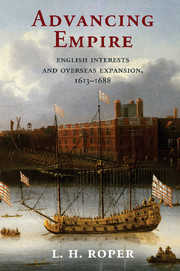'In this bold, bracing, and invigoratingly comprehensive reinterpretation of the foundations of the seventeenth-century English Empire in Asia and the Americas, L. H. Roper illustrates the important role of private interests and fundamentally reshapes the understanding of the formation of imperial power in the founding period by looking at the English Empire in the round.'
Trevor Burnard - University of Melbourne
'In this innovative reconsideration of England’s rise to empire, Roper studies the seventeenth century and emphasizes private enterprise and individual initiative rather than a pre-eminently powerful state apparatus. Balancing current intellectual trends, he reads history forward instead of anachronistically reinterpreting it backwards.'
Daniel Littlefield - University of South Carolina
'This impressive book examines the seventeenth-century origins of England's global empire, locating its roots not in state initiatives but in a myriad of chartered corporations and individuals who traded and colonized from America to Asia. Roper provides one of the best portraits of the modest beginnings of what would later become the world's premier empire.'
Owen Stanwood - Boston College
'In this engaging new book, Roper introduces us to a coterie of private 'colonial-imperialists' who advanced and promoted English overseas expansion across the globe in the seventeenth century. This book is a welcome addition to the body of recent scholarship that has, perhaps, placed too much emphasis on English empire-building as an intended outcome of early modern state formation.'
Ken MacMillan - University of Calgary
'Roper examines the creation and development of England’s overseas empire, questioning the new historiographical trend that characterizes the pre-1688 English state as the central driving force in overseas expansion. Instead, he argues that up until and even after 1688, private interests were essential to building and expanding the empire. Roper explains that overseas expansion began with individuals who, after establishing overseas connections, sought to strengthen their relationship with the state to ensure preference and the protection of their gains and profits. Individuals and their endeavors thus drew the state into the colonial world, rather than the other way around. The author provides three fascinating chapters on expansion in America, Africa, and Asia, followed by an extended analysis of the overseas empire from the civil war to 1688. The book's focus on individuals’ roles in building and expanding the empire adds balance to an ongoing debate and should be read by advanced undergraduates, graduate students, and specialists. Highly recommended.'
J. Rankin
Source: Choice
‘Who created the English empire? The state or private initiative? In a well-written study, L. H. Roper shows that the English state might have backed individual noblemen in their overseas endeavours, but never took the lead.’
Pieter Emmer
Source: The English Historical Review



